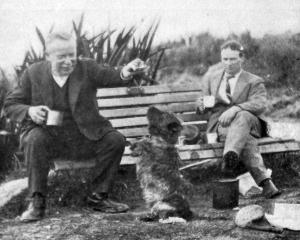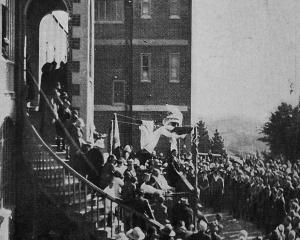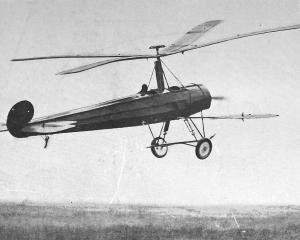When bicycles first came into general use they were viewed with open suspicion, which resulted in the erection of a toll gate and a tax of 5s upon every bicycle that passed through. After a time that impost was reduced to 1s, then to 6d, and finally to half that amount.
Eventually the toll gate was abolished about the time that motor cars came into prominence, and after a while they came under the ban of the Portobello Road Board, a narrow majority on which has always regarded them as a menace to the public safety on the lower road.
From time to time the vigorous minority has sought to have the restrictions removed as far as Macandrew's Bay to suit the convenience of rural dwellers who have no ferry steamer service, and have to rely on motorcycles or other means of locomotion, but up to the present the ''anti-motorists'' have maintained their opposition inflexibly.
One of the periodical discussions ensued at a meeting of the board yesterday, when it transpired that the warning boards notifying motorists that the Beach road was barred to them was being persistently defaced as fast as they were erected.
Two members urged strong measures to obtain convictions against every offender, but the majority appeared impressed with the idea that a defaced notice could not be called ''a legal notice'' and, deeming discretion the better part of valour, allowed the matter to drop.
Wellington: The provisions of the Treaty of Waitangi are being discussed by the Maori Conference which is at present sitting in Wellington, with a view to seeing how far they have infringed by subsequent legislation regarding the Native land questions.
The Government, the delegates contend, wants to ''Europeanise'' their holdings and give the Maoris the freehold. The wise Maoris, it is stated, do not want the freehold, for they are opposed to selling their lands, and they are quite willing that legislation should be brought in to that effect.
They also want to protect the foolish members of the various ''hapu'' from parting with their holdings. Further than that, under ''The Native Land Act, 1909'', five Maoris can sell a block of land irrespective of the number of owners, and the conference wants this altered.
The Land Board also has power to lease idle Native lands for 50 years, but the conference thinks this should be reduced to 21 years. At the end of that time the Maori would perhaps want to work the land himself, and he should be given the opportunity if he so desires. The present system only encouraged him to sit down and wait for his rent, and made him thriftless.
Passengers in the night expresses, when crossing the Waimarino Plains, are usually asleep in their carriages, but the engine-driver sees some strange sights, especially in winter. Recently, while the express was crossing the plains, the moon rose behind the lofty truncated cone of Ngauruhoe.
All of a sudden the engine-driver heard a prolonged roar, which woke people in their beds right down as far as Owhango, and a pear-shaped column of smoke and steam shot up from the crater to a height nearly equalling that of the mountain itself, and was followed by a shower of lava and ashes. It took quite a long time for the cloud to drift away, but it finally vanished in a thin dark streak.
- ODT, 8.8.1913











